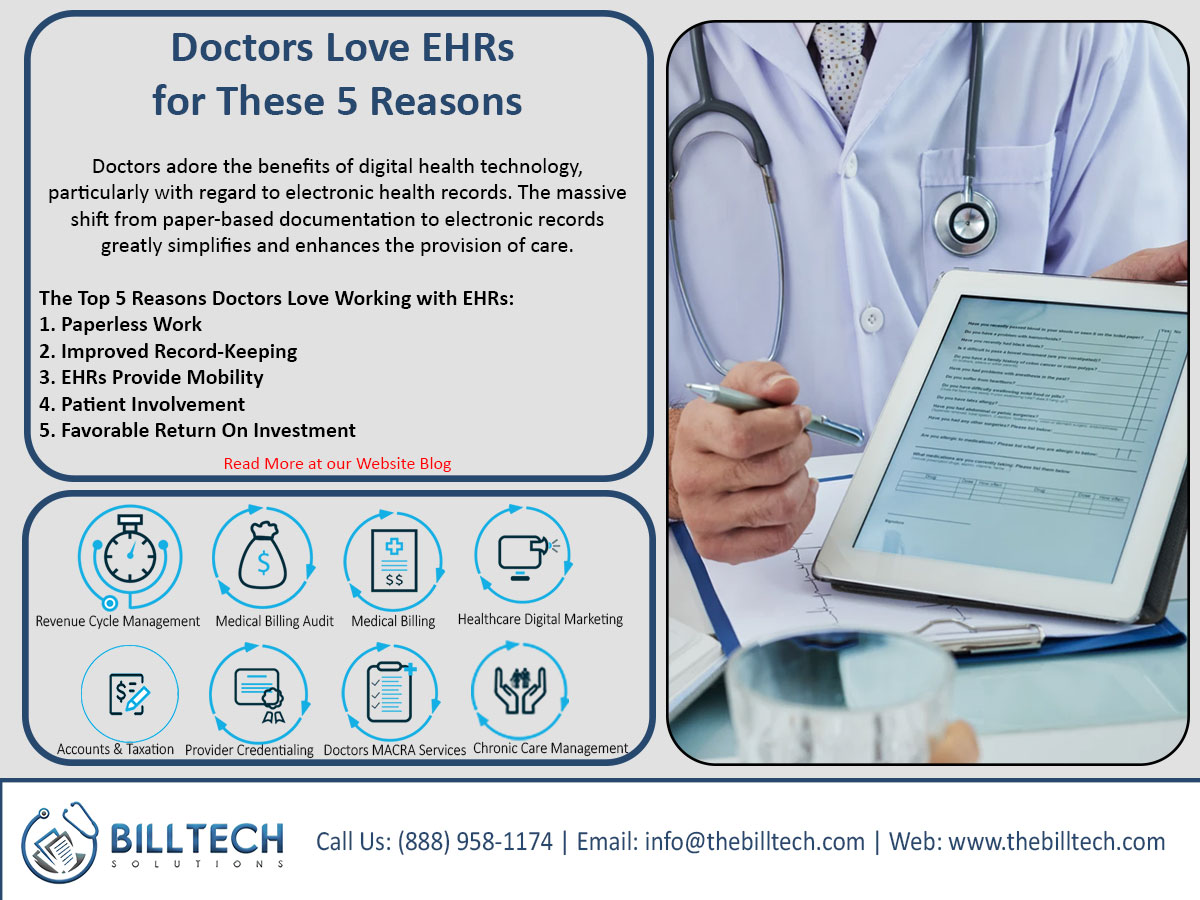Doctors Love EHRs for These 5 Reasons
Electronic Health Record System (EHRs) Significance for Medical Billing
Doctors adore the benefits of digital health technology, particularly with regard to electronic health records. The massive shift from paper-based documentation to electronic records greatly simplifies and enhances the provision of care. The primary explanations for why providers like working with EHR are given below.


The Top 5 Reasons Doctors Love Working with EHRs
1. Paperless Work
The elimination of many paper-based tasks, such as handwritten instructions and office notes, is the main advantage of EHRs. Documents that are handwritten may not be readable and may be difficult to share with other caregivers.
Conversely, digital records stored in electronic health records (EHRs) are easily interchangeable with other clinicians in a clinical context and do not have any reading issues. With just a single button click, patient charts may be easily obtained from EHRs and accessed by multiple caregivers at once. In EHRs, data is unified, standardized, and readily shared.
2. Improved Record-Keeping
EHR-stored data is more accurate, comprehensible, comprehensive, and compliant with evaluation and management standards. This results in precise recording and enhanced oversight of patient consultations. Prior to the use of electronic health records, physicians had to deal with a lot of paper errors, including incorrect prescription notes. On the other hand, EHRs significantly reduce the possibility of errors, which enhances the note-taking and reporting procedures and reduces errors.
3. EHRs Provide Mobility
With an effective EHR system, doctors may deliver patient care without being restricted to their offices. Instead, they have instant access to complete reports, external medical records, and patient requests made outside of their office. A lot of EHRs are tablet and smartphone compatible, giving doctors more flexibility in how they manage their time. For professions like ophthalmology that use a lot of imaging, mobility is a valuable add-on.
The ophthalmologist will advance significantly in terms of mobile access to visual medical knowledge. Additionally, it avoids the cost of repeatedly printing x-ray images and other important visual details. As a result, mobile data sharing offers a speedier and less expensive option for sending medical photos, enabling a significant improvement in patient care quality.
4. Patient Involvement
Most doctors are aware of how crucial electronic health records are to empowering patients to take care of themselves. Patients are able to manage their care more actively thanks to the patient portals integrated with EHRs. In addition to asking important questions of the healthcare practitioners, they can apply for electronic medicine refills and make appointment requests online.
On the other hand, providers have the ability to promptly respond to any of these inquiries with only a few mouse clicks. Patient involvement eventually results in less effort for doctors and better outcomes for patients.
5. Favorable Return On Investment
EHRs significantly reduce a number of delivery-related expenses. EHRs streamline practice workflows, which allows doctors to save a lot of money. A productive EHR increases physician productivity, enabling them to see more patients each day. By streamlining medical orders, follow-ups, billing, and visiting notes, it increases provider productivity.
In a similar vein, EHRs also improve operational efficiency by lowering overhead expenses and the need for functional staff. Ultimately, it enhances the company’s revenue outlook. Certified EHR systems may also be helpful in the practice to meet the requirements for government incentives for meaningful use. Because of improved administrative efficiency, more accurate medical billing and coding, and streamlined workflows, the organization has seen a rise in revenue.
EHR offers a sophisticated method that is customizable to your practice’s workflows. It has an integrated patient portal, a functional management solution that increases performance and efficiency, and an easy-to-use interface. Leading healthcare organizations and RCM businesses in the US use EHR because of its cutting-edge user experience, which supports creative medicine practices.
Contact Us For Free Consultation.


